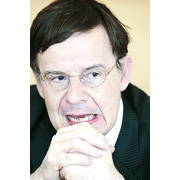Different world of jobs in NK
Westerners or, for that matter, South Koreans are always impressed when they are told that somebody in North Korea is a medical doctor.
It is seen as an embodiment of career success ― like it would be, no doubt, in Seoul, New York or London. However, North Korea is different: the North Korean doctors do not enjoy even nearly the same treatment as their pampered and, frankly, overpaid Western colleagues.
In the West, the doctors came to occupy a unique position of well-paid and much revered professionals. Their corporations zealously guard their privileges and raise a hell every time these privileges are threaten in any way. Being a doctor in the West is synonymous with success.
Meanwhile, the Communist countries chose the Soviet model of health care. Within this model being a doctor means an otherwise unremarkable white-collar job, in income and social standing roughly similar to that of a high school teacher.
Incidentally, this relatively low esteem did not necessarily influence the actual performance of the public health system: the Communist states, in spite of rather problematic economic performance and low income, were able to establish remarkably efficient systems of health care, and relative cheapness of doctors’ labor was one of the ingredients in their achievements.
Indeed, the case of medical doctors is a good confirmation of the peculiarities of the North Korean system of prestige attached to different jobs.
For example, another Western group of overpaid professionals, lawyers, hardly exist in North Korea at all. Independent litigation is possible only under a very limited set of circumstances, and usually the outcome of a court case is a foregone conclusion. Defense lawyers cannot play any serious social role and, of course, their fees are very moderate. In some cases, a skilled lawyer might find a well-paid job, but the number of these jobs is very small.
However, some jobs are much more prestigious in the North than Westerners would normally expect. In most cases, these seemingly low-level jobs give access to cash, part of which can be pocketed with impunity.
Most such jobs are to be found in retail trade and services. Even in the age of strict rationing when everything was distributed rather than sold, imaginative sales clerks and their supervisors found numerous ways to steal from the state and/or buyers. Nowadays, such opportunities have increased greatly.
Thus, the actual income of a sales clerk usually is many times higher than his or her official salary. A large part of this “black income” goes to the clerk’s supervisors who in turn send the cash even higher. Thus, being in the retail trade is a very lucrative occupation.
The same was the case in the Soviet Union and many other East European countries. However, Soviet intellectuals and party cadres (who were more willing to emulate the intellectuals than the intellectuals ever admitted) until the end of the USSR kept a certain social distance from the “retail people.” It was profitable to be a shop manager in Moscow or Leningrad in 1980, but the then Soviet equivalent of the “smart set” would look down at you anyway.
This is obviously not the case in North Korea. The intellectuals’ disdain to the machinations did not influence the society at large, and it is quite normal for, say, a party cadre or secret police operative to marry a shop manager. Indeed, the predominantly female sales clerks make a large part of their marriage partners – something unthinkable in the former USSR.
Another job which bears much prestige is a driver. I have heard about a situation when somebody was not allowed to become a driver simply because he was not a party member.
What is special about being driver? First and foremost, his ability to travel across the country almost at will. This means that he (never she – it is strictly a male job) can charge money for delivering packages and also occasionally take fee-paying passengers. This became a source of considerable income in recent years when the growing private markets produced movement of people and goods of hitherto in an unknown scale. On top of that, drivers do their own small business smartly using the price differences between regions.
And, of course, all jobs with access to foreign currency are highly privileged, as it has been the case for decades. The diplomats, employees of joint companies and even ships crews on international routes comprise very special groups. People dealing with foreigners inside North Korea ― tour guides, drivers etc. ― are not doing that well, but they also occasionally get or extract “gifts” from the foreigners.
But what about educators who are kept in such a reverence in South Korea? Or engineers? Or scientists? They are not very low in the North Korean pecking order, but they are not too high either. But that is another story… <The Korea Times/Andrei Lankov>











































































